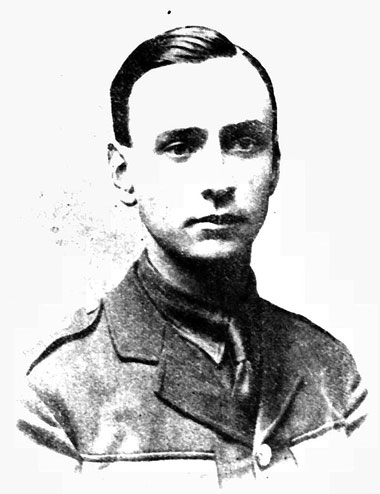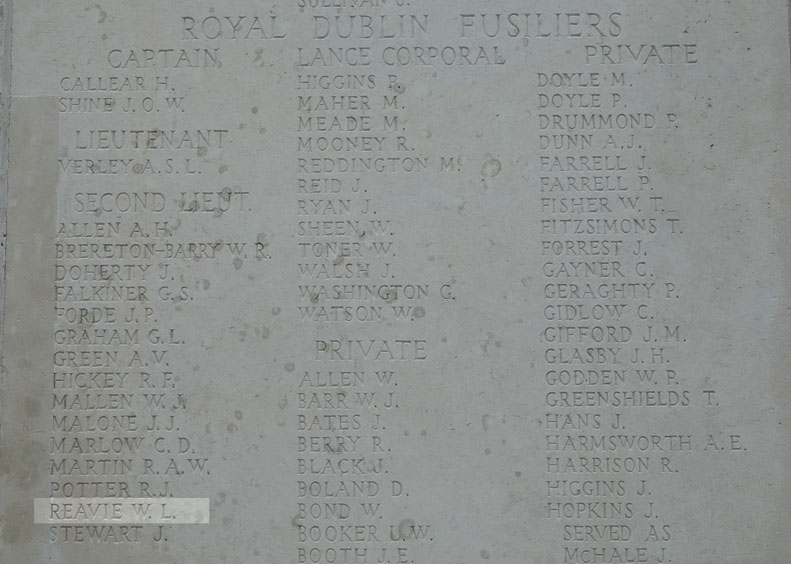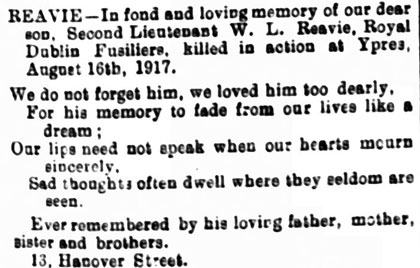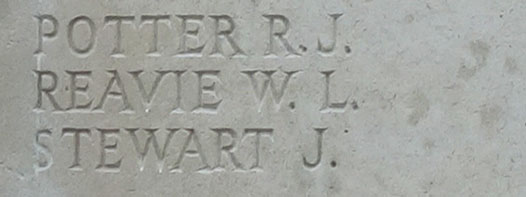![]() In memoriam
In memoriam ![]()
Second Lieutenant Wilfred Lawrence Stewart Reavie

Wilfred Lawrence Stewart Reavie (or Reavy) was born on 2 January 1897 at Jarvis Street, Portadown, County Armagh, the first of six children of poulterer John Reavy and his wife Mary (née Brown). Educated at the Methodist School, Partadown, at the time of the 1911 Census he was living at Woodhouse Street, Portadown, with his parents and two brothers, and working as an assurance clerk. He later worked as a clerk in the offices of the Daisy Hill Nurseries, Newry.
Reavie enlisted in the North Irish Horse at Portadown on 3 September 1914 (No.1124), overstating his age by two years. On 1 November he was appointed unpaid lance corporal. Two weeks later he was deprived of a day's pay and fined six day's pay for being absent from noon until watchsetting. He retained his rank however, and on 1 December was promoted to corporal.
He embarked for France on 1 May 1915 with D Squadron of the North Irish Horse. His brushes with authority continued – on 31 May earning a reprimand for disobeying an order and on 6 September another for neglect of duty. Nevertheless, he was made acting sergeant on 24 July and confirmed in that rank the following month.
On 23 October 1916, after a month's course of instruction at the 3rd Army Infantry School, Reavie applied for a commission in the 9th Battalion, Royal Irish Fusiliers. His commanding officer Lord Cole, supporting the application, wrote that "He is well educated, keen and capable of commanding men."
Revie departed for England in December and, following four weeks' leave, reported for duty at the No.3 Officer Cadet Battalion, Bristol on 8 January 1917. On 26 April 1917 he was commissioned as a 2nd lieutenant and posted to the 3rd (Reserve) Battalion, Royal Dublin Fusiliers. Soon after he was sent to France and attached to the 2nd Battalion, then part of the 16th (Irish) Division, on the Ypres front.
On 16 August 1917 the 2nd Battalion, Royal Dublin Fusiliers, took part in the Battle of Langemarck, part of the Third Ypres offensive. The battalion war diary recorded that from the 15th to the 17th it lost 19 officers and men killed, 79 wounded, 13 gassed, and 21 missing.
Reavie was initially reported as missing, but soon after his death was confirmed. His family received letters from fellow officers with some details of the circumstances, which were later published in the Portadown News:
Mrs. Reavie, mother of the late Second-Lieutenant W. L. Reavie, Portadown, has received the following letter from Captain L. C. Byrne, Dublin Fusiliers:--
My dear Mrs Reavey,--By this time, no doubt, you will have heard from the War Office about the death in action on the 16th August of your son, Laurence. I cannot express to you, Mrs Reavie, my sorrow or my sympathy with you in your great loss. Coming as it does so suddenly, and within such a short time of his joining the Battalion, it must be very hard to bear. You will have the consolation of knowing that your son died as I am sure you would have wished him to do – leading his men into action at Ypres on the morning of the 16th. We had some very difficult ground to attack over, and some very well-defended strong points to capture. It was whilst capturing one of these that your son was killed instantaneously by a machine gun. His servant was also killed with him. I was unable to get his body as the Germans advanced and drove us out of the position we were in at the time your son was killed. I have sent all his kit home, and I now enclose his letters and papers which I know you would like to have. If there is anything else I can tell you or do for you please let me know as I am only too willing to help you. We all miss Laurence very much – he was so cheery in the mess and with the men. Once again, Mrs Reavie, let me express my deepest sympathy with you in your great bereavement.
Major Richard Bird, S.C.F., writes:– Dear Mr Reavie,-- I had a letter from Mr Halahan, re your brave son, who was in my Brigade. I have been extremely busy, and have not yet been able to write to the friends of all who have fallen.
I only knew your boy slightly, but I can assure you that his battalion is loud in their praises of his bravery and worth. He attacked a machine gun emplacement and fell shot through the head. Owing to the nature of the battle his body could not be buried, but it will have been by the subsequent battalion as we were taken away shortly afterwards.
Thank God we have still the precious memory of our loved ones, and the assurance that death is not the end of all. May the God of all comform solace you and yours in this hour of distress and sorrow.
Two months later Reavie’s father wrote seeking information about his death and his kit:
Dear Sirs With reference to my son 2nd Lieut W.L. Revie, 2nd Royal Dublin Fusiliers, reported missing believed killed on 16th August & later reported killed, I should be glad to know if you have any further particulars about his death or burial. If so will you kindly send me a certificate of his death, & also the name & address of his platoon Sergt. The Captain informs us that the platoon Sergt saw my son killed. The Capt also informed us that he had sent my sons kit home on the 24th Aug, but as yet it has not arrived. Can you trace it for us? as we would like very much to have his belongings. We know of three officers who were killed on the same date as my son & their friends have received their kits fully a month ago. This makes us think it strange that our son’s kit hasn’t arrived home. We will feel greatly obliged if you will kindly give us all the information re my son’s death at your disposal. Yours Respectfully John Revie
As he has no known grave, 2nd Lieutenant Reavie is commemorated on the Tyne Cot Memorial, Zonnebeke, West-Vlaanderen, Belgium, Panel 144.

Portadown News, 21 December 1918


Portadown News, 16 August 1919
Memorial images Copyright © Phillip Tardif with all rights reserved as set out in this Use of Material policy. First image of Reavie, as an officer cadet, courtesy of Michael Nugent.
This page last updated 30 March 2024.

